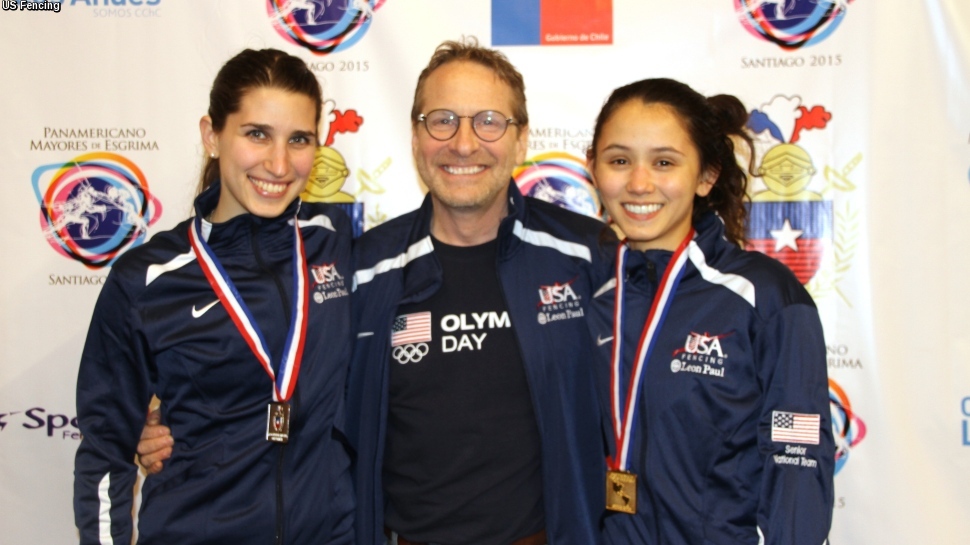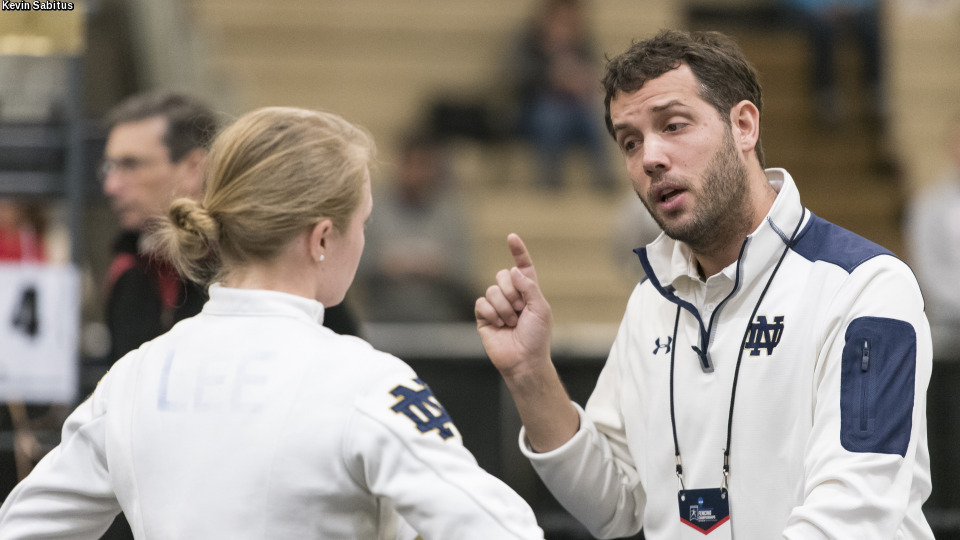Jan. 24, 2017
By Jennifer Prosser
As the athletes wielded their weapons at the 2016 National Fencing Championships, it was Hall of Fame Olympic women’s foil coach Anthony “Buckie” Leach who dropped the bombshell: he would be moving from his elite Manhattan fencing club to join the Fighting Irish program in Notre Dame, Indiana.
“It was the biggest bombshell,” Irish head fencing coach and long-time friend of Leach, Gia Kvaratskhelia said. “No one could believe it. No one anticipated that he make that move to South Bend. That the best coach would come here will just elevate Notre Dame to that next level. Recruiting, developing, everything. We were absolutely jubilant when he committed.”
During his career, Leach’s students have included seven Olympians; two Under-20 World Champions; five Under-17 World Champions; three World Championship bronze medalists; an Olympic Silver Medalist; four NCAA Champions; several collegiate All-Americans; and numerous U.S. National Champions. His resume fits well with the program that Kvaratskhelia has built, which features 10 NCAA individual champions; 38 All-Americans; and roughly half of the current U.S. women’s national junior and senior teams. Kvaratskhelia himself helps coach the U.S. Junior Men’s Foil team and associate head coach Cedric Loiseau coaches at the national level as well, working with the U.S. Cadet Men’s Epee team.
“The environment and way we’ve been recruiting for the past few years we’ve had the opportunity to create something really great here,” Kvaratskhelia said. “Buckie felt like it was appealing to him. To us, it was appealing to bring the best professional in the field who has the character, the integrity and would fit the Notre Dame mold. Not just for his ability to coach on the strip, but off the strip as well.”
 U.S. Women’s Foil Coach Buckie Leach, pictured with Irish senior and Olympian Lee Kiefer (right), joined the Irish fencing staff at the conclusion of the 2016 Rio Olympics.
U.S. Women’s Foil Coach Buckie Leach, pictured with Irish senior and Olympian Lee Kiefer (right), joined the Irish fencing staff at the conclusion of the 2016 Rio Olympics.
To Leach, coming to Notre Dame meant an opportunity to join a mature and focused program. Instead of working at a club with athletes ranging in skill from beginner to advanced and in ages from 10 to 25, a university program has just a four-year age span of elite athletes. Instead of going around town to find the right physical trainers, medical professionals and advisors, everything at Notre Dame is in-house.
“It’s the way a national program should work,” Leach said. “But we don’t have the ability to do that in the States so easily, so it’s very exciting here. There’s so many people all around the athletes who are trying to help them succeed, it’s amazing. Everything is amazingly well-taken-care-of here.”
The concentration of elite fencers at the university level also serves to continuously improve their play. The coaches, the athletes and even potential recruits all recognize the benefits of such a program.
“There is the same base of fencing that they study [at club and university], but here we amplify to the next level,” Kvaratskhelia said. “We have such a great pool of the kids together here, the practices are much more intense. Competition, internally, is pretty tough. At clubs they might have two or three great fencers, some great clubs have a larger bulk, but here we get to combine all in one gym. That makes it a lot more challenging for them to practice together.”
“For a kid to leave his home coach and club is difficult,” Leach said. “They want to have someone they’re going to who will be equally as good or even better than the person that they work with at home. One of the key things about college is all of a sudden you get a lot of good athletes training with each other. That’s almost more important than the coaching. We obviously do a lot of coaching, but the idea that we have a lot of strong kids together fencing all the time is really the thing that makes more of the difference. We’re important, but having good strong opponents is even more important.”
In addition to having a large group of elite fencers improving each other, at Notre Dame they do so with all of the different weapons: foil, epee and sabre.
“It’s a very unique format to get all the weapons together,” Loiseau said. “You don’t see it anywhere in national fencing, so it’s very cool. Here you get all the weapons together and you get the exchange also. Because even though they’re very different weapons, there are things you can compare and use in your style.”
 Irish associate head coach Cedric Loiseau, who specializes in epee, has contributed at the national level as a coach at cadet men’s epee events.
Irish associate head coach Cedric Loiseau, who specializes in epee, has contributed at the national level as a coach at cadet men’s epee events.
Kvaratskhelia envisions that having a program comprised of national athletes and coaches of all styles and levels will continue to grow the success of the Notre Dame fencing team. From Loiseau’s involvement with the cadet men’s epee team, to Leach’s overseeing of the women’s senior foil program and Kvaratskhelia’s own work with the junior men’s foil squad, there is a developing access channel between Notre Dame and the world’s elite fencers.
“As we see how world fencing evolves and develops, we also grow as professionals,” Kvaratskhelia said. “We bring those changes and implement them here, that’s the goal. It is a tribute to the Notre Dame coaches’ level – and Buckie is the best example – that they are invited to coach the national team. Our coaching staff has the ability to be on any level, collegiate, high school or world class. Our coaches are qualified for anything thrown at them.”
Bringing on such experienced coaches is part of Kvaratskhelia’s plan to continue attracting new classes of talented fencers in the future.
“Everybody knows our names so it makes recruiting a little easier,” Leach said. “For a lot of kids, the opportunity to train with the national coach or someone who works with the national coaching staff is very helpful. … People will be like, ‘That’s the guy I want to work with, or will be willing to go there and train.'”
Already, the plan seems to be successful, even internationally. Loiseau recounted French cadet fencers’ familiarity with the University of Notre Dame at the European Circuit Event he coached at in November 2016, emphasizing the familiarity of the coaching staff.
“We’re not just U.S. fencing, we’re Notre Dame,” Loiseau said. “I believe that’s big and it has to be helpful. When parents come to us and they’re really happy with our coaching, that’s a big thing. When they send their kids to college, they want a great education and they know they’re going to have it at Notre Dame, but they also want great fencing. And when they see us be involved with their kids, it makes a big difference.”
As Notre Dame fencing goes into its 2017 spring season, the dedication and experience of its athletes and coaches will drive its success. As it goes on to future seasons, the culture created by Kvaratskhelia, Loiseau, Leach and the rest of the staff will continue to carry its progress.
-ND-







